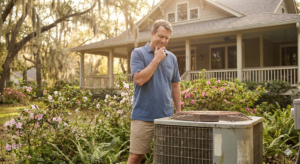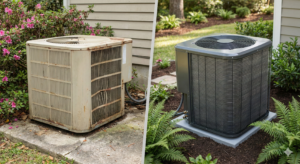If your energy bills have started climbing and your home’s temperature never seems quite right, your HVAC system might be working harder than it should. Many households in Charleston deal with poor airflow, stuffy indoor air, or units that never cycle off. These are all signs that your HVAC may not be running as efficiently as it could. And while it might feel like you need a complete system overhaul to fix it, small changes can often make a big difference.
Boosting HVAC efficiency helps keep your home more comfortable during the hot South Carolina summers while easing the strain on your wallet. You don’t need special tools or tech knowledge to get started. Just a few consistent habits, small upgrades, and the right professional support when needed can keep things running better, longer.
Regular Maintenance
HVAC systems work hardest during Charleston’s long, humid summers. Without regular care, dust builds up, parts wear down, and the system slowly loses steam. Eventually, all this leads to short cycling, weak airflow, and uneven cooling. Routine check-ups help catch the wear and tear before it becomes a bigger problem.
Making time for maintenance doesn’t have to be complicated. Consistent care goes a long way to keep everything moving the way it should.
Here’s a quick list of things homeowners can do:
1. Swap air filters every 1–3 months, especially in the summer.
2. Check the outdoor compressor unit for leaves or yard debris.
3. Clear furniture and rugs away from vents to allow proper airflow.
4. Listen for odd noises, like banging or buzzing, during operation.
These simple steps support better function. But scheduling a professional maintenance check at least once a year helps cover the parts of your system that you can’t see or safely fix on your own. Trained HVAC companies in Summerville are able to inspect electrical components, refrigerant levels, and tune up the unit as needed.
A professional can also give recommendations about improving insulation and airflow or let you know when an aging part needs replacing. Catching that early can prevent a repair from becoming a full-on breakdown when it’s hot out and service schedules fill up fast.
Upgrading Your Thermostat
A major reason homeowners deal with inconsistent temperatures isn’t the HVAC unit itself. It’s often the device telling it what to do. Old-school thermostats don’t always adjust well to temperature swings. Having to manually change the temperature throughout the day doesn’t help your system work any less.
Smart thermostats are a helpful upgrade. They learn your habits and adjust on their own, helping your unit only run when it needs to. Many models let you schedule different temperatures while you’re home, sleeping, or away. This can create less wear on your HVAC system and more comfort indoors, especially in homes with unpredictable schedules.
When choosing a thermostat for your Charleston home, look for one that works with your current HVAC set-up and doesn’t require a complicated installation. Some homes, especially older ones, might need an adapter or rewiring to support newer models. A local expert can help you figure out what works best and even install it for you.
Once installed, managing your comfort gets easier. No more adjusting the temp all day or coming home to a house that feels like an oven. The thermostat does the thinking for you so your HVAC system can work smarter, not harder.
Improving Insulation and Sealing
Insulation plays a big role in keeping your home cozy when it’s chilly and cool when it’s hot. Without the right insulation, your HVAC system battles against the outside temperature, working harder than it should. Proper insulation ensures that all that cool air stays inside your home instead of slipping away through little gaps.
Identifying and sealing leaks is a simple way to keep things efficient. You might start by checking spots where air commonly escapes, like windows, doors, and attics. Look closely for any cracks or spaces where you feel air moving. Using weatherstripping or caulk to seal these areas can make a noticeable difference without much cost.
There are a variety of materials to improve insulation depending on your home’s needs. Fiberglass is a common choice in walls and attics, while spray foam works well in hard-to-reach areas. If you’re unsure where to start, asking a local pro is a smart move. They can help identify gaps and recommend the best material for Charleston’s climate.
Better insulation means your HVAC system can take a breather. And when it’s not working so hard, you save on energy and extend the life of your system.
Keeping Vents and Filters Clean
Clean filters are a must for any HVAC system. They trap dust and pollutants, keeping the air you breathe fresher and healthier. But if they’re not replaced regularly, they get clogged and force your system to work overtime. This can lead to poor performance and even long-term system damage.
Here’s a simple checklist to keep your vents and filters in shape:
1. Check and change filters every month during peak usage seasons.
2. Vacuum vent covers and grilles often to get rid of dust build-up.
3. Make sure furniture or curtains aren’t covering vents.
4. Listen for odd sounds from your system such as clicking or humming.
Obstructed vents not only cut down on airflow but also make it hard for rooms to stay even in temperature. A blocked vent can keep your bedroom stuffy while your living room stays cool. Keeping vents open and filters fresh helps every part of the house stay comfortable.
It’s a quick task with big results. Combined with proper insulation and a current thermostat, it allows your HVAC to run more efficiently every day of the season.
Stay Cool and Efficient All Summer Long
Improving your HVAC system’s efficiency doesn’t have to be a massive project. Small, consistent actions and a few smart upgrades can go a long way in keeping your Charleston home comfortable. From managing airflow with clean vents to installing a smart thermostat, every little improvement adds to a smoother-running system.
Regular maintenance from HVAC companies in Summerville can keep your system in top shape, catch early signs of trouble, and offer advice specific to your home’s needs. With the right steps and the right help, you’ll manage summer heat more easily, your HVAC system will last longer, and your energy spending can stay in check. The best part is, your home will simply feel better to live in—day or night.
If you’re looking for reliable HVAC support in Charleston, Coastal Carolina Comfort is here to help. As one of the trusted HVAC companies in Summerville, we offer personalized service to keep your system running smoothly year-round. From preventative maintenance to smart upgrades, our experienced team ensures your home stays cool and comfortable when it matters most.


